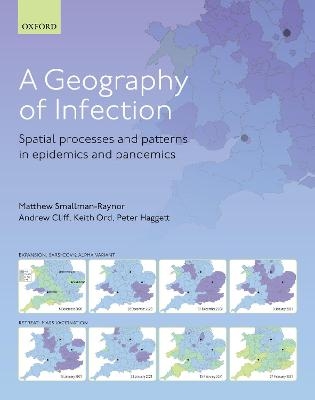
A Geography of Infection
Oxford University Press (Verlag)
978-0-19-284839-0 (ISBN)
The last half century has witnessed two landmark events in medical history. The 1970s saw euphoria about the defeat of one of humankind's oldest disease scourges with the global eradication of smallpox. To set against this, the 2020s are experiencing the pandemic ravages of new viral diseases, of which COVID-19 is currently the most potent. But it is only the latest of a succession of threats. A Geography of Infection explores the distinctive spatial patterns and processes by which such infectious diseases spread from place to place and can grow from local and regional epidemics into global pandemics.
This resource focuses initially on the local scale of doctors' practices and small islands where epidemic outbreaks are slight in the numbers infected and in geographical extent. Such local area studies raise two questions. First, how and where do epidemic diseases emerge and second, why do more diseases appear to be emerging now? To approach such questions implies a shift in spatial gear from painting epidemics with a fine-tipped local brush to an expanded palette on which doctors' practices and small islands are replaced by regional and global populations. Simultaneously, time bands are extended backwards to the origins of civilization and forwards into the twenty-first century. It eventually leads to a consideration of global pandemics - both historical (for example, plague, cholera and influenza) and contemporary (HIV/AIDS and COVID-19) and examines the ways the spread of infection can be prevented. All chapters are extensively illustrated with full-colour diagrams and maps - some of which are in colour for the first time.
Bringing together the authors' collective 150 years of experience in research, mapping, and writing on spatial aspects of medical history, this is an invaluable resource for anyone interested in the spread, control, and eradication of epidemic and pandemic diseases.
Professor Matthew R. Smallman-Raynor, Professor of Geography, University of Nottingham, since 2004. Educ: Cambridge University, BA (1988), MA Cantab. (1991), PhD (1991). Res. Associate in Geog., Univ. of Cambridge, 1991-94; Lectr in Geog., Univ. of Exeter, 1994-96; Univ. of Nottingham: Res. Fellow, 1996-98; Lectr in Geog., 1998-2001; Reader in Geog., 2001-4. Professor Andrew D. Cliff, European Academy 2002; FBA 1996; RGS/IBG Victoria Medal Victoria Medal, 2017, for research excellence in spatial epidemiology. Professor of Theoretical Geography, University of Cambridge, since 1997; Pro-Vice-Chancellor 2004-10; Fellow, Christ's College, Cambridge, since 1974. Educ: King's Coll. London (BA 1964); Northwestern Univ. (MA 1966); Univ. of Bristol (PhD 1969; DSc 1982); MA Cantab. 1973. FSS 1968. Teaching Asst in Geog., Northwestern Univ., 1964-66; University of Bristol: Res. Associate in Geog., 1968-69; Lectr 1969-72; Lectr in Geog., Univ. of Cambridge, 1973-91; Reader in Theoretical Geog., Univ. of Cambridge, 1991-97. Professor J. Keith Ord, Professor Emeritus of Business Statistics at Georgetown University since 2015. Educ. London School of Economics B.Sc(Econ), 1973, Ph.D. (1967). Univ. of Bristol: Res. Asst in Econ,1966-67, Lect. In Econ and OR, 1967-74; Univ. of Warwick: Reader in Stat., 1974-1980. Pennsylvania State Univ.: Professor of Mgmt Sci and Stat, 1980-99; Georgetown Univ.: Professor of Operations Mgmt and Stat. 1999-2015. Professor Peter Haggett, CBE ScD (Cantab) FBA. Emeritus prof. geog., University of Bristol. Hon degr. UK: Bristol, Durham, UCL, UWE: Other: Copenhagen, Helsinki, York(Can). For.memb: US Nat.Acad.Sci, Amer.Acad. Arts. Sci.; Chmn. Hist. Med. Ctte, Wellcome Trust. J.J.Hill vis.prof. (Public Health, Geog.), Wisconsin. PAHO Fellow, Centers for Disease Control (CDC).
| Erscheinungsdatum | 13.04.2022 |
|---|---|
| Verlagsort | Oxford |
| Sprache | englisch |
| Maße | 225 x 282 mm |
| Gewicht | 778 g |
| Themenwelt | Studium ► 1. Studienabschnitt (Vorklinik) ► Med. Psychologie / Soziologie |
| Studium ► Querschnittsbereiche ► Epidemiologie / Med. Biometrie | |
| Studium ► Querschnittsbereiche ► Geschichte / Ethik der Medizin | |
| Studium ► Querschnittsbereiche ► Prävention / Gesundheitsförderung | |
| ISBN-10 | 0-19-284839-9 / 0192848399 |
| ISBN-13 | 978-0-19-284839-0 / 9780192848390 |
| Zustand | Neuware |
| Informationen gemäß Produktsicherheitsverordnung (GPSR) | |
| Haben Sie eine Frage zum Produkt? |
aus dem Bereich


